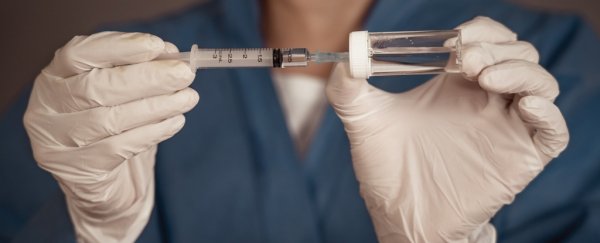Public health officials are investigating the cause of several severe allergic reactions that were reported among hundreds of thousands of people vaccinated with the Pfizer-BioNTech coronavirus vaccine last week.
As of Friday (December 18), six people who received the jab in the US developed anaphylaxis, or a severe allergic reaction that can be life-threatening if left untreated, according to The Centers for Disease Control and Prevention (CDC).
One of those patients had previously developed anaphylaxis after receiving a rabies vaccination, but it's not clear if the other participants also had a prior history of severe allergies.
The previous week, two people in the UK, both with a history of severe allergies, developed anaphylaxis-like symptoms after receiving the Pfizer vaccine, prompting the country's regulatory agency to advise people who have previously had "significant" allergic reactions to vaccines, medicines or food to avoid the vaccine, Live Science previously reported.
In the US, the Food and Drug Administration (FDA) is recommending that only people who have previously had a severe allergic reaction to other vaccines or to any of the ingredients listed in Pfizer's vaccine avoid the shot.
But are these events truly allergic reactions to the vaccine and if so, what is causing them? One possibility is a chemical commonly used in laxatives that is in both the Pfizer and Moderna vaccines.
But it's also possible that some of the cases are not true allergic reactions at all, one expert told Live Science. And in either case, the reactions are very rare.
Though there's no way to know for sure, one ingredient in the Pfizer vaccine is coming under suspicion. A compound called polyethylene glycol (PEG), "could be the culprit," Dr. Peter Marks, the director of the Food and Drug Administration's (FDA) Center for Biologics Evaluation and Research, told reporters on Friday (December 19).
This compound is also present in Moderna's vaccine, which has a similar makeup to Pfizer's, and was given emergency approval in the US on December 18.
It's the leading culprit because the rest of the ingredients in Pfizer's vaccine are "lipids and salts and sugar and things that are unlikely allergens," said Dr. Purvi Parikh, allergist and immunologist at NYU Langone Health, who was not involved in the vaccine's development. PEG is found in many medications, such as those that treat constipation, but allergy to it is rare, Parikh said.
Rare, but not unheard of: Some drugs that contain PEG have occasionally caused anaphylaxis, according to Science Magazine. And prior exposure to the compound may have led some people to develop high levels of antibodies against it, putting them at risk of anaphylaxis.
While concerning, "the important thing to note is we don't know for sure if these were all truly allergic reactions," Parikh told Live Science. Some other conditions can mimic allergic reactions, and they're much more benign, she said.
One such condition is "vasovagal syncope," which happens when people get very anxious (say because of a needle) and their heart rate and blood pressure drops and they faint, she said.
"True allergic reactions to vaccines are very rare," she said. "Statistically, you're more likely to be hit by lightning than have a true anaphylactic reaction to a vaccine."
On average, the chance of developing anaphylaxis after receiving a vaccine is about 1.31 in one million, according to a 2015 study published in the Journal of Allergy Clinical Immunology.
Still, it's "really important to get a full history and have these incidents evaluated so we have a better idea of what's going on," Parikh said.
Even if it turns out that these are all true allergic reactions, they have occurred in only a small fraction of the hundreds of thousands of people in just the US alone who have already received the Pfizer vaccine.
These cases may be "making the news but many people are tolerating the vaccine without any issue," Parikh said. As of December 19, about 272,000 doses of Pfizer's coronavirus vaccine had been given to health care workers across the US; and as of December 20, that number increased to 556,300 doses, according to the CDC. (Still, if all those cases are borne out, it would mean the Pfizer vaccine could be more likely than other vaccines to trigger allergic reactions.)
Neither Moderna's nor Pfizer's clinical trials found that the vaccine caused severe adverse events such as anaphylaxis. While people who are allergic to any of the ingredients in the vaccines were excluded from the trials, people with severe food or drug allergies were not.
In Pfizer's trials, anyone who had a severe reaction from any vaccine in the past was excluded, according to Science Magazine.
The National Institutes of Health (NIH) is starting a study to investigate what's causing these allergic reactions to Pfizer's coronavirus vaccine, and is expected to recruit volunteers who have had a history of severe allergic reactions, according to The Washington Post.
But in the meantime, the CDC recommends that everyone who receives the Pfizer vaccine should be observed for 15 minutes after the jab (this is common practice for all vaccines, according to The Conversation).
And anyone who has had a history of severe allergic reactions should stay in the doctor's office or clinic for half an hour. All six patients who had severe reactions had them within this "recommended observation window," and were promptly treated, according to the CDC.
This article was originally published by Live Science. Read the original article here.
